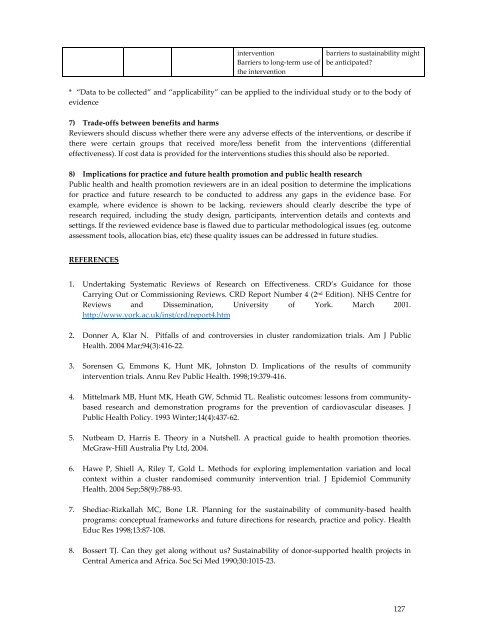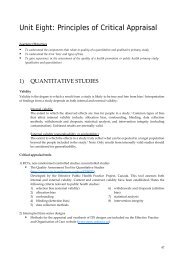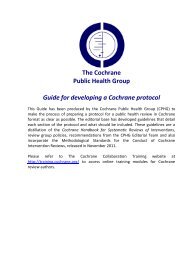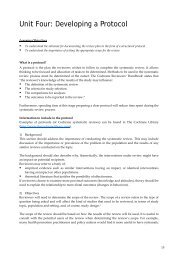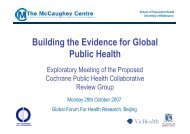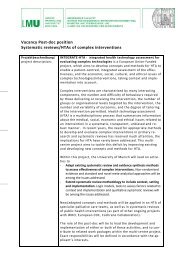Train the Trainer Course book - Cochrane Public Health Group
Train the Trainer Course book - Cochrane Public Health Group
Train the Trainer Course book - Cochrane Public Health Group
Create successful ePaper yourself
Turn your PDF publications into a flip-book with our unique Google optimized e-Paper software.
intervention<br />
Barriers to long-term use of<br />
<strong>the</strong> intervention<br />
barriers to sustainability might<br />
be anticipated?<br />
* “Data to be collected” and “applicability” can be applied to <strong>the</strong> individual study or to <strong>the</strong> body of<br />
evidence<br />
7) Trade-offs between benefits and harms<br />
Reviewers should discuss whe<strong>the</strong>r <strong>the</strong>re were any adverse effects of <strong>the</strong> interventions, or describe if<br />
<strong>the</strong>re were certain groups that received more/less benefit from <strong>the</strong> interventions (differential<br />
effectiveness). If cost data is provided for <strong>the</strong> interventions studies this should also be reported.<br />
8) Implications for practice and future health promotion and public health research<br />
<strong>Public</strong> health and health promotion reviewers are in an ideal position to determine <strong>the</strong> implications<br />
for practice and future research to be conducted to address any gaps in <strong>the</strong> evidence base. For<br />
example, where evidence is shown to be lacking, reviewers should clearly describe <strong>the</strong> type of<br />
research required, including <strong>the</strong> study design, participants, intervention details and contexts and<br />
settings. If <strong>the</strong> reviewed evidence base is flawed due to particular methodological issues (eg. outcome<br />
assessment tools, allocation bias, etc) <strong>the</strong>se quality issues can be addressed in future studies.<br />
REFERENCES<br />
1. Undertaking Systematic Reviews of Research on Effectiveness. CRD’s Guidance for those<br />
Carrying Out or Commissioning Reviews. CRD Report Number 4 (2 nd Edition). NHS Centre for<br />
Reviews and Dissemination, University of York. March 2001.<br />
http://www.york.ac.uk/inst/crd/report4.htm<br />
2. Donner A, Klar N. Pitfalls of and controversies in cluster randomization trials. Am J <strong>Public</strong><br />
<strong>Health</strong>. 2004 Mar;94(3):416-22.<br />
3. Sorensen G, Emmons K, Hunt MK, Johnston D. Implications of <strong>the</strong> results of community<br />
intervention trials. Annu Rev <strong>Public</strong> <strong>Health</strong>. 1998;19:379-416.<br />
4. Mittelmark MB, Hunt MK, Heath GW, Schmid TL. Realistic outcomes: lessons from communitybased<br />
research and demonstration programs for <strong>the</strong> prevention of cardiovascular diseases. J<br />
<strong>Public</strong> <strong>Health</strong> Policy. 1993 Winter;14(4):437-62.<br />
5. Nutbeam D, Harris E. Theory in a Nutshell. A practical guide to health promotion <strong>the</strong>ories.<br />
McGraw-Hill Australia Pty Ltd, 2004.<br />
6. Hawe P, Shiell A, Riley T, Gold L. Methods for exploring implementation variation and local<br />
context within a cluster randomised community intervention trial. J Epidemiol Community<br />
<strong>Health</strong>. 2004 Sep;58(9):788-93.<br />
7. Shediac-Rizkallah MC, Bone LR. Planning for <strong>the</strong> sustainability of community-based health<br />
programs: conceptual frameworks and future directions for research, practice and policy. <strong>Health</strong><br />
Educ Res 1998;13:87-108.<br />
8. Bossert TJ. Can <strong>the</strong>y get along without us? Sustainability of donor-supported health projects in<br />
Central America and Africa. Soc Sci Med 1990;30:1015-23.<br />
127


